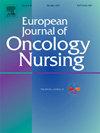对乳腺癌妇女的性健康增强计划的影响:一项准实验研究
IF 2.7
3区 医学
Q1 NURSING
引用次数: 0
摘要
目的:本研究评估了基于许可、有限信息、具体建议、强化治疗(PLISSIT)模式的文化适应性性健康促进(SHE)项目在解决乳腺癌女性性健康挑战方面的有效性。它调查了该项目对性功能、痛苦、身体形象、婚姻亲密关系和性知识的影响。方法采用准实验前测-后测设计,纳入50例已婚乳腺癌患者,均为乳房切除术后5年内未进行乳房再造术的患者。参与者分为干预组(n = 24)和对照组(n = 26)。干预包括每周一次的小组会议和电话咨询。使用经过验证的工具在基线、测试后1周和5周评估结果。性痛苦ResultsThe干预组有显著改善(F = 24.852,p & lt; 0.001),身体形象(F = 25.887,p & lt; 0.001),和性知识(F = 60.876,p & lt; 0.001)。婚姻亲密度随时间的推移而提高(F = 7.050,p = 0.011),但没有发现显著的群体时间交互作用(F = 0.478,p = 0.493)。性功能差异无统计学意义(F = 0.748,p = 0.391)。结论SHE项目有效地改善了乳腺癌幸存者的性困扰、身体形象和知识。为身体形象和婚姻亲密度量身定制的干预措施仍然至关重要,未来的研究应该探索数字解决方案和配偶参与,以提高结果。本文章由计算机程序翻译,如有差异,请以英文原文为准。
Effects of a sexual health enhancement program for women with breast cancer: A quasi-experimental study
Objective
This study evaluated the effectiveness of a culturally adapted Sexual Health Enhancement (SHE) program, grounded in the Permission, Limited Information, Specific Suggestions, Intensive Therapy (PLISSIT) model, in addressing sexual health challenges in women with breast cancer. It examined the program's impacts on sexual function, distress, body image, marital intimacy, and sexual knowledge.
Methods
A quasi-experimental pretest−posttest design included 50 married women diagnosed with breast cancer within five years post-mastectomy without reconstruction. Participants were divided into intervention (n = 24) and control (n = 26) groups. The intervention consisted of four weekly group sessions and phone consultations. Outcomes were assessed at baseline, one week, and five weeks posttest using validated tools.
Results
The intervention group showed significant improvements in sexual distress (F = 24.852, p < 0.001), body image (F = 25.887, p < 0.001), and sexual knowledge (F = 60.876, p < 0.001). Marital intimacy improved over time (F = 7.050, p = 0.011), but no significant group-by-time interaction was found (F = 0.478, p = 0.493). Sexual function showed no significant differences (F = 0.748, p = 0.391).
Conclusions
The SHE program effectively improved sexual distress, body image, and knowledge in breast cancer survivors. Tailored interventions for body image and marital intimacy remain essential, and future research should explore digital solutions and spousal involvement to enhance outcomes.
求助全文
通过发布文献求助,成功后即可免费获取论文全文。
去求助
来源期刊
CiteScore
4.40
自引率
3.60%
发文量
109
审稿时长
57 days
期刊介绍:
The European Journal of Oncology Nursing is an international journal which publishes research of direct relevance to patient care, nurse education, management and policy development. EJON is proud to be the official journal of the European Oncology Nursing Society.
The journal publishes the following types of papers:
• Original research articles
• Review articles

 求助内容:
求助内容: 应助结果提醒方式:
应助结果提醒方式:


